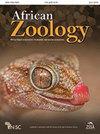Physiological Measure of Animal Welfare in Relation to Semi-Captive African Elephant (Loxodonta africana) Interaction Programs
IF 0.5
4区 生物学
Q4 ZOOLOGY
引用次数: 3
Abstract
Elephant interaction programs, specifically ones that provide elephant back riding, have come under public scrutiny, and little information exists to show whether these activities affect animal welfare. This study examined the impact of human interactions and ride-based activities on physiological stress-related indicators in African elephants. Fifteen trained semi-captive elephants, as well as free-ranging elephants roaming under the same ecological conditions, were monitored. Faecal samples were collected over a nine-month period from both groups and these were analysed using an enzyme immunoassay detecting faecal glucocorticoid metabolites (fGCMs) with a 5β-α-ol-11-one structure. Elephants that participated in elephant-back-safari (EBS) activities showed significant decreases in fGCM concentrations when EBS were discontinued. Similarly, fGCM concentrations of the trained semi-captive individuals that did not participate in EBS showed decreased steroid concentrations over the same time. Overall, fGCM concentrations of the trained semi-captive herd and the free-ranging herd did not differ significantly. The collected data will help to better understand the physiological and behavioural requirements of semi-captive elephants with frequent exposure to humans. The findings will also help to optimise management strategies for wild elephant populations and elephants living in controlled environments on reserves exposed to wildlife tourism.半圈养非洲象(Loxodonta africana)互动项目中动物福利的生理测量
大象互动项目,特别是提供大象骑行的项目,已经受到公众的审查,几乎没有信息表明这些活动是否会影响动物福利。这项研究考察了人类互动和骑行活动对非洲象生理压力相关指标的影响。对15头经过训练的半圈养大象以及在相同生态条件下漫游的自由放养大象进行了监测。在九个月的时间里,从两组中收集粪便样本,并使用酶免疫测定法检测粪便中具有5β-α-ol-11酮结构的糖皮质激素代谢产物(fGCMs)进行分析。当EBS停止时,参与大象背游(EBS)活动的大象的fGCM浓度显著降低。类似地,未参与EBS的经过训练的半圈养个体的fGCM浓度在同一时间内显示出类固醇浓度降低。总的来说,经过训练的半圈养牛群和自由放养牛群的fGCM浓度没有显著差异。收集的数据将有助于更好地了解经常接触人类的半圈养大象的生理和行为需求。这些发现还将有助于优化野生大象种群和生活在野生动物旅游保护区受控环境中的大象的管理策略。
本文章由计算机程序翻译,如有差异,请以英文原文为准。
求助全文
约1分钟内获得全文
求助全文
来源期刊

African Zoology
生物-动物学
CiteScore
2.60
自引率
9.10%
发文量
18
审稿时长
>12 weeks
期刊介绍:
African Zoology , a peer-reviewed research journal, publishes original scientific contributions and critical reviews that focus principally on African fauna in terrestrial, freshwater, and marine ecosystems. Research from other regions that advances practical and theoretical aspects of zoology will be considered. Rigorous question-driven research in all aspects of zoology will take precedence over descriptive research. The Journal publishes full-length papers, critical reviews, short communications, letters to the editors as well as book reviews. Contributions based on purely observational, descriptive or anecdotal data will not be considered.
The Journal is produced by NISC in association with the Zoological Society of South Africa (ZSSA). Acceptance of papers is the responsibility of the Editors-in-Chief in consultation with the Editors and members of the Editorial Advisory Board. All views expressed are those of the author and not necessarily those of the Editors or the Department.
 求助内容:
求助内容: 应助结果提醒方式:
应助结果提醒方式:


